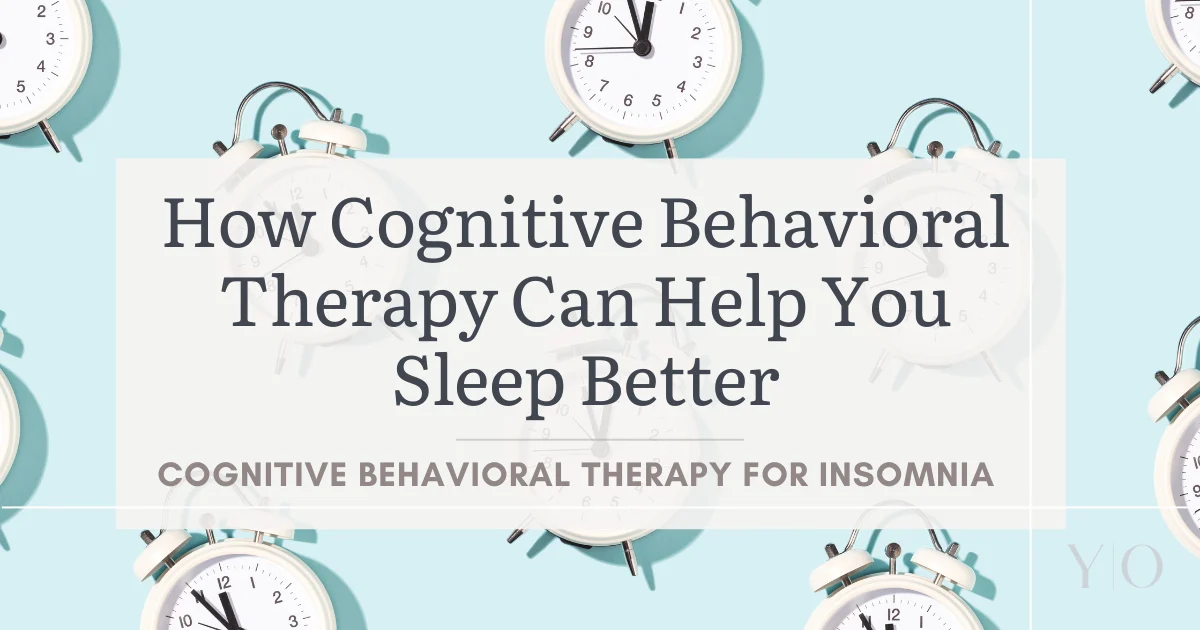If you’ve ever laid awake staring at the clock, wishing you could just fall asleep, you’re not alone. Insomnia affects millions of people, but there’s hope! Getting a good night’s sleep is essential for our overall well-being. Yet for millions of people insomnia becomes a constant struggle, making it hard to fall asleep, stay asleep, or wake up feeling refreshed. While medications or quick fixes like a new pillow might offer temporary relief, Cognitive Behavioral Therapy for Insomnia (CBT-I) offers a scientifically proven, drug-free solution that helps manage and overcome sleep issues for lasting results. Based on robust scientific evidence of its effectiveness in treating chronic insomnia, the American Academy of Sleep Medicine has given CBT-I a STRONG ranking in its clinical practice guidelines.
Table of Contents
Understanding Insomnia
Insomnia is characterized by difficulty falling asleep, staying asleep, or waking up too early and not being able to get back to sleep. This condition can affect anyone, at any age, and is often linked to stress, anxiety, depression, or even poor sleep habits. Over time, insomnia can lead to daytime fatigue, irritability, difficulty concentrating, health problems, and a decreased quality of life. While medications can provide temporary relief, they don’t address the root causes of insomnia. CBT-I, on the other hand, targets the underlying factors contributing to poor sleep and provides long-term solutions that help individuals establish healthier sleep patterns.
What is Cognitive Behavioral Therapy for Insomnia (CBT-I)?
CBT-I is a structured, evidence-based treatment that helps individuals identify and change the thoughts, behaviors, and environmental factors that negatively impact their sleep. CBT-I breaks the insomnia cycle by teaching you practical skills to improve sleep, reduce sleep-related stress, and challenge unhelpful thoughts that contribute to sleeplessness.
The Core Components of CBT-I
- Sleep Education
One of the first steps in CBT-I is to educate individuals about sleep. This includes understanding the sleep cycle, the role of circadian rhythms, and how lifestyle choices influence sleep quality. By learning what’s happening in our bodies when we sleep, we can release some of the fear and stress that often surround sleep problems. Although there is plenty of information available about sleep, it can be challenging to determine what’s truly accurate, and sometimes we only have enough knowledge to mislead us. Understanding the fundamentals of sleep through CBT-I can help clarify myths and provide a solid foundation for improving sleep. - Cognitive Restructuring
Many individuals with insomnia develop negative thoughts about sleep, such as “I’ll never get enough sleep,” or “If I don’t sleep well tonight, I won’t be able to function tomorrow.” These thoughts can fuel anxiety, making it even harder to sleep. Cognitive restructuring helps individuals challenge these unhelpful thoughts by creating more balanced, realistic thoughts grounded in facts. This process reduces sleep-related anxiety and helps break the cycle of worry that can worsen insomnia. - Sleep Efficiency Training
Sleep efficiency training involves adjusting the time you spend in bed to match the amount of sleep you’re actually getting. This helps strengthen your sleep drive, encouraging your body to fall asleep more easily and stay asleep longer. - Stimulus Control
This technique focuses on associating the bed with sleep rather than activities that might interfere with sleep such as watching TV or worrying. By implementing stimulus control individuals learn to use their bed and bedroom only for sleep and intimacy. This helps strengthen the natural connection the brain makes between the bed and sleep, making it easier for your mind and body to recognize that the bed is a place for rest. Over time, this strengthens sleep patterns and can improve the overall quality of sleep. - Relaxation Techniques
Stress and anxiety can make it difficult to wind down before bed. Relaxation exercises such as progressive muscle relaxation, deep breathing, and guided imagery are incorporated into CBT-I to help individuals calm their minds and bodies before bedtime, making it easier to fall asleep. - Sleep Hygiene
Good sleep hygiene is a package of habits and routines designed to create an environment that promotes restful sleep. It involves adjusting your lifestyle and surroundings to support better sleep overall. A therapist specializing in treating insomnia will help design a sleep hygiene plan tailored to the unique needs of the client, ensuring it aligns with their individual challenges and goals.
Why is CBT-I Effective?
CBT-I has been shown to improve sleep quality, reduce time spent awake, and alleviate the anxiety often associated with chronic insomnia. Unlike medications, which can have side effects or lead to dependency, CBT-I provides long-term benefits without the risks. By addressing the psychological and behavioral factors contributing to insomnia, CBT-I empowers individuals to regain control over their sleep. Rather than just providing short-term relief, CBT-I promotes lasting change by targeting the root causes of insomnia, empowering you to maintain healthier sleep patterns without relying on medications.
What to Expect in CBT-I Sessions
CBT-I is typically delivered in 8 sessions, where you’ll work alongside a skilled CBT-I therapist who will guide you through each technique. While CBT-I is based on specific techniques, it’s important to remember that each session is tailored to your individual needs. It’s a gradual process, and while there’s no instant fix, many people start to notice improvements in their sleep in just a few weeks. Be patient with yourself as lasting changes take time and you’ll gain valuable tools that will set you up for better sleep for years to come.
Is CBT-I Right for You?
CBT-I can be a great option if you’re struggling with insomnia and want to address the root causes of your sleep issues. It’s especially helpful if you’ve tried medications without long-term success or want to avoid relying on sleep aids. CBT-I is safe, effective, and suitable for people of all ages, including those with coexisting conditions such as anxiety or depression. If you’re interested in exploring CBT-I, it’s important to find a therapist who specializes in this treatment. They will be able to customize the approach to meet your specific needs and help you achieve lasting improvements in your sleep.
Cognitive Behavioral Therapy for Insomnia (CBT-I) is an effective treatment for many, but there are some important contraindications to consider. Individuals with sleep apnea should ensure they are using a prescribed device, such as a CPAP or dental appliance to manage the condition before pursuing CBT-I. It’s crucial to consult your healthcare provider to ensure it’s done safely. CBT-I is also contraindicated for individuals with unstable psychiatric conditions, psychotic disorders, bipolar disorder, epilepsy, seizure disorders, untreated excessive sleepiness, or those at high risk for falls. In these cases, medical advice or alternative treatments may be more appropriate. CBT-I is not suitable for individuals in high-risk occupations, such as heavy machinery operators or drivers, or for those with shift work schedules. Always consult with a healthcare professional to determine the best course of treatment.
Take the Next Step Toward Restful Sleep
Insomnia can feel like a never-ending struggle, but it doesn’t have to control your life. With CBT-I, you can break free from the cycle of sleepless nights and reclaim the restful sleep you deserve. With the right support, it’s entirely possible to reclaim your sleep, improve your overall health, and feel more energized each day.
Don’t let another sleepless night control your life — take the first step toward better sleep today by contacting Dr. Oren at 775-525-8100. Specializing in Cognitive Behavioral Therapy for Insomnia (CBT-I), Dr. Oren has extensive experience helping individuals in Reno, Sparks, Washoe County, and throughout Northern Nevada overcome sleep challenges. With a personalized, compassionate approach, Dr. Oren will work closely with you to develop a treatment plan tailored to your unique needs, guiding you toward lasting, restorative sleep. Put your insomnia to bed today!
Please note that the information provided in this blog post is for informational purposes only and is not intended as a substitute for professional therapy or mental health treatment.
Learn More: Expert Advice and References
- American Academy of Sleep Medicine (AASM)
Information on CBT-I as a first-line treatment for insomnia.
https://sleepeducation.org/insomnia/treatment/cognitive-behavioral-therapy-for-insomnia/



